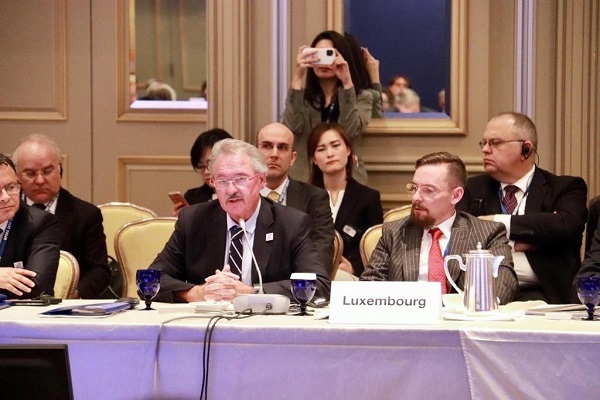 Jean Asselborn, Minister for Foreign and European Affairs, and Michel Leesch, Deputy Director for European Affairs and International Economic Relations of the Ministry of Foreign and European Affairs;
Credit: MAEE
Jean Asselborn, Minister for Foreign and European Affairs, and Michel Leesch, Deputy Director for European Affairs and International Economic Relations of the Ministry of Foreign and European Affairs;
Credit: MAEE
During his visit to Japan from 24-26 October 2019, Luxembourg's Minister of Foreign and European Affairs, Jean Asselborn, participated in the Ministerial Meeting of the Global Forum on Steel Excess Capacity (GFSEC) on Saturday.
The forum brings together 33 economies, that is all G20 members plus other interested OECD countries, as well as all the major world steel producers. Its objective is to put an end to government practices that are responsible for distortions in the steel market and thus contribute to the problem of overcapacity. The forum was chaired on this occasion by the new Japanese Minister of Economy, Trade and Industry, Hiroshi Kajiyama.
In his speech, Minister Asselborn stressed that "Luxembourg believes that extending the mandate of the forum is essential. The issue of steel overcapacity has not yet been solved, with more than 500 million tonnes per year still in excess". He also noted that "the global forum is a multilateral instrument put in place at a critical moment", adding that "we are all aware that the international trading system and the WTO are confronted with huge challenges. Therefore, the G20, with the support of other forum members, must send the signal that multilateral cooperation is still working".
Recalling that Luxembourg experienced a serious crisis in the steel industry decades ago and that its industry continues to be under significant pressure, Minister Asselborn pointed out that "the steel sector is more than an industry, it affects workers and their families", adding that "That's why we have to persevere". Jean Asselborn thus called on all members of the forum to support the continuation of the forum's three-year mandate.
Finally, Minister Asselborn expressed hope for a renewal of the mandate or any other solution that could lead to concrete results, including a reduction in steel production overcapacity in China.








